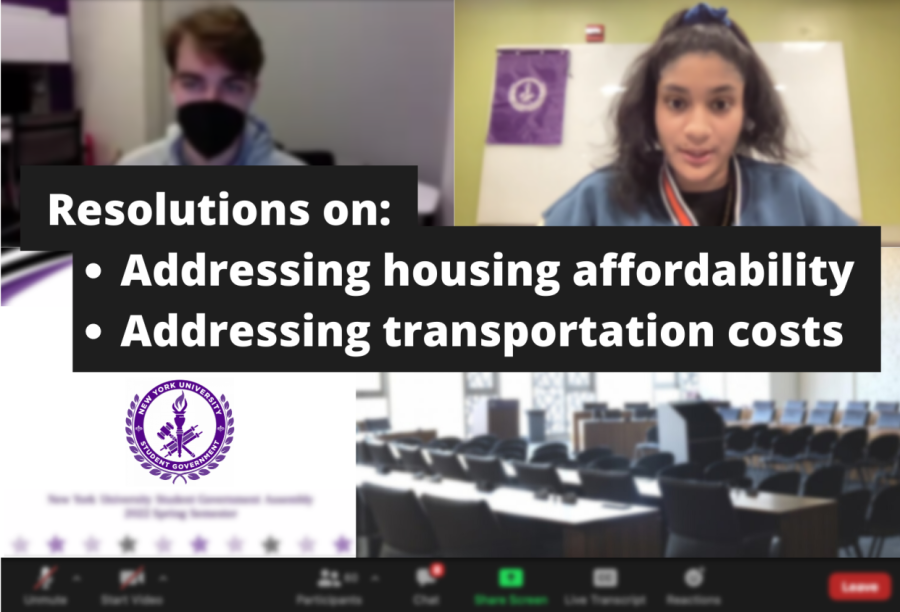Student gov’t passes resolutions on housing, transport affordability
During its second meeting of the semester, NYU’s student government announced plans to call for discounted subway tickets and an evaluation of housing costs.
The most recent Student Government Assembly meeting was held on Thursday, Feb. 3. They debated resolutions on transportation costs and housing affordability. (Image via SGA, Staff Illustration by Edward Franco)
February 7, 2022
The Student Government Assembly passed two new resolutions on housing affordability and transportation costs in its second meeting of the semester on Feb. 3. Members also discussed an upcoming 10-year report addressing the university’s long-term performance and goals.
Housing and transportation resolutions approved
Ryan Carney, the Financial Affairs Committee chair, introduced two new resolutions addressing transportation costs and housing affordability for NYU students. Both resolutions passed with an overwhelming majority vote.
The housing affordability resolution calls for greater support for students living both on and off campus, including by developing a support team for at-risk students, creating a University Senate group to investigate housing insecurity, prioritizing higher-need students in lower-cost NYU housing and eliminating or reducing housing security deposits.
The second resolution, which focuses on helping students manage transportation costs associated with attending classes and jobs, seeks to create a partnership between NYU and the Metropolitan Transportation Authority to provide discounted subway passes for the entire study population.
“In New York, transportation plays a big part in getting to classes, internships, jobs, and a lot of major cities have partnerships with their local transportation organization,” Carney said.
A new senator at-large and changes to the chair election process
The SGA also voted to elect a new senator at-large representing Black, trans and gender-expansive students, succeeding the previous bearer of the position, Iman Yusuf. Results of the vote will be announced to the student government later this week.
Last week, Shawn Thibault, the senator representing the NYU School of Law and chair of the Organization and Governance Committee, proposed a resolution to elect the SGA chairperson through a student body vote. Discussion about the resolution — which was to take place during this meeting — was postponed to the next special student government meeting on Feb. 17.
SGA members share input on NYU’s 10-year self-assessment
CAS professor Wendy Suzuki and Vice Provost Diana Arpino discussed NYU’s decennial evaluation by the Middle States Commission on Higher Education, a nonprofit organization that requires internal assessments of colleges. Over the next two years, the study will examine rigor, mindfulness, inclusion and utility at NYU. A complete report of the study’s first findings will be published in spring 2024.
The results will be accessible on NYU’s website, where students, faculty and staff can learn about the report and share their thoughts.
“We see it as a natural point, to learn something about ourselves and to do something with what we’ve learned,” Arpino said. “And it’s actually an amazing time for us to do this — and to do this particular study — because we’ve learned so much in navigating the pandemic.”
The study has four priorities: research in science and art, complex university challenges, global education, and the quality of education and student experience. Suzuki and Arpino, chairs of the assessment, will incorporate the perspectives of student government representatives and the rest of the student body into the study.
Student government representatives shared what changes they would like to see in NYU’s future, such as more people of color hired as therapists at NYU’s Wellness Center, a better course registration process and greater student representation on the board of trustees.
“Having an environment where students don’t need to ask professors/admin for accommodations, or need them to be sensitive to issues of DEI [diversity, equity and inclusion],” wrote Tzivia Appleman, a CAS senior and a senator at-large. “I hope that the NYU environment will reach the point where admin are proactive to anticipate student needs and accommodations, and will be inclusive without students feeling the need to constantly push.”
Contact Sofi Cisneros at [email protected].























































































































































